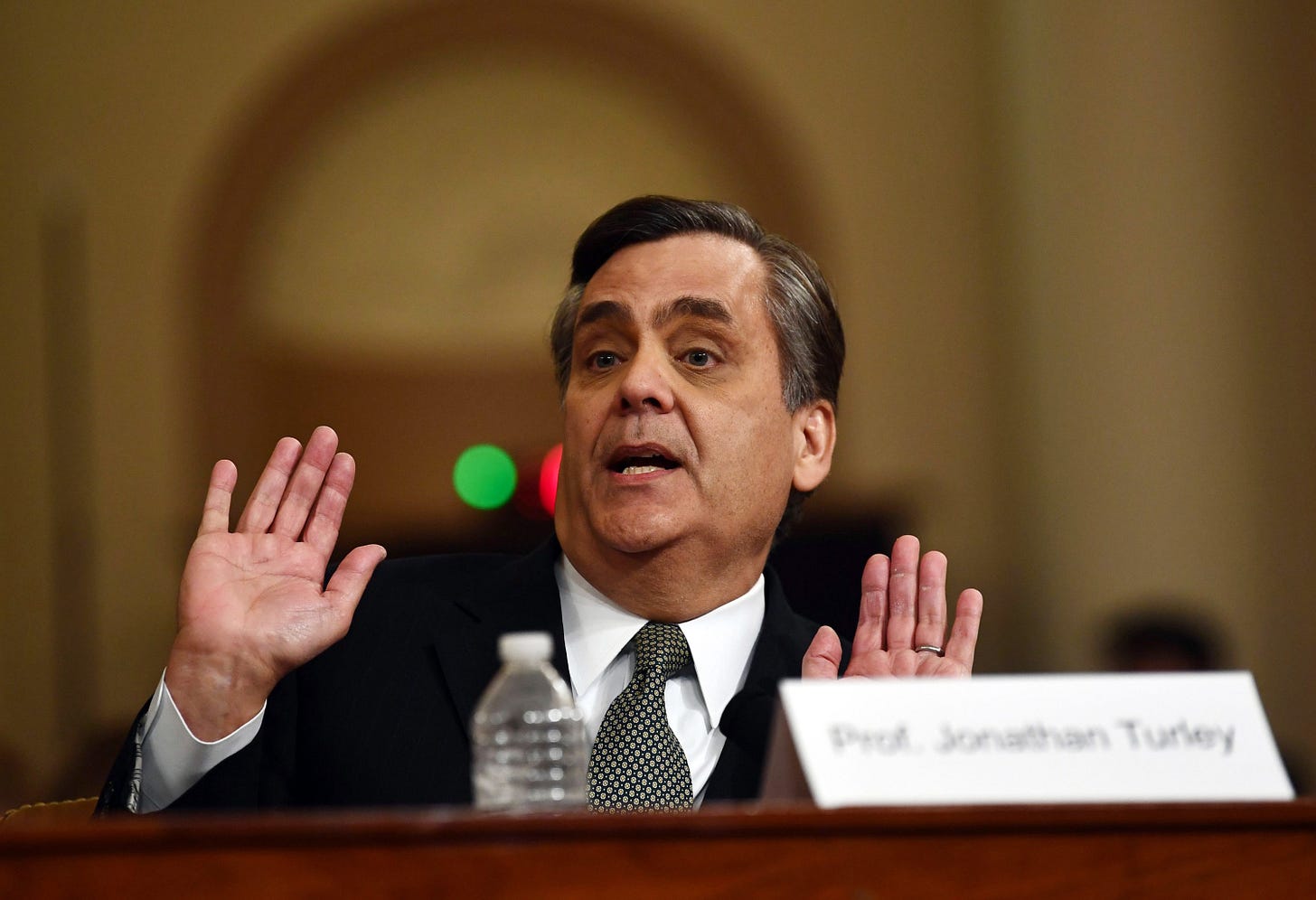Turley’s Weak Critique
The legal scholar’s case against impeaching Trump doesn’t hold water.

Pity the congressional Republicans. Today’s impeachment hearing before the House Judiciary Committee was the best day they’ve had in a long time, and it was still pretty bad.
Unlike their colleagues on the Intelligence Committee, the Judiciary Committee Republicans mostly eschewed conspiracy theories and Nunesian churlishness. Instead, their dominant tone was one of disbelief, confusion, and sorrowful exasperation, with a sprinkling of showy interruptions to gripe about routine procedural matters. They were led in this effort by ranking member Doug Collins, whose Georgia twang is perfectly suited to plaintive-but-hollow process complaints, and by law professor Jonathan Turley, the only one of the four witnesses whom the Republicans had requested. (The other three witnesses, although respected experts, are all decidedly left-leaning law professors, which some observers have reasonably criticized as a bit of unreasonable deck-stacking by the Democrats on the committee. After all, there are plenty of Republican, or at least conservative, constitutional scholars who would have been happy to support the case for impeachment.)
The tone of today’s hearing was a tactical improvement for the Republicans, who should have been responding to the impeachment proceedings more in sorrow than in anger all along. Had the Intelligence Committee’s Republicans last month not embraced the nuttier defenses of the president—e.g. he’s deeply passionate about fake Ukrainian influence in American elections—they could have avoided embarrassing themselves in front of Fiona Hill and the entire country.
The Judiciary Committee Republicans were able at times to give an almost colorable defense of the president today. Led by Republican counsel Paul Taylor, Turley offered a reasonable-sounding critique of the impeachment process now underway, with three main points:
1) Because the Democrats have gone too fast, the factual record is incomplete—and inadequate for as momentous an act as removing a democratically elected president.
2) Some of the impeachable offenses that President Trump is being accused of committing—namely, bribery and obstruction of justice—don’t match the way those crimes are defined by law.
3) The impeachment hearings so far have only featured the case against the president, not the case for him.
There were gaping holes in each of Turley’s arguments. Let’s take them in turn:
1) In making the case that the factual record is incomplete, Turley suggested that the Democrats should issue more subpoenas. That would be a more helpful suggestion if the White House weren’t currently blocking key figures in the Ukraine scandal—including former National Security Advisor John Bolton, former Energy Secretary Rick Perry, Secretary of State Mike Pompeo, Acting White House Chief of Staff Mick Mulvaney, and others—from complying with congressional subpoenas. Turley also never made clear what kind or amount of additional information would bridge the gap between what he considers unsubstantiated assertions and what he conceded would be an impeachable offense.
2) Regarding the offenses President Trump is accused of: Back when President Clinton was facing impeachment, Turley argued that an act didn’t have to meet the definition of a crime to be impeachable, as Paul Rosenzweig pointed out to The Bulwark today. Rosenzweig, a former lawyer on Ken Starr’s Whitewater investigation staff, noted by email: “Twenty years ago, Professor Turley wrote that a crime did not have to be committed for an action of the President to be an impeachable offense.” Today, though, Turley insists that for an action to count as bribery under the impeachment clause, it must satisfy the legal definition of the criminal offense of bribery—“an opinion,” Rosenzweig says, “that is manifestly wrong, if only because the impeachment clause was written before we created federal criminal law.” So, Rosenzweig asks of Turley, “What changed? One suspects that the only relevant change was the party affiliation of the President. Situational ethics are . . . situational.”
3) Even if Turley were correct in his contention that the impeachment hearings have so far not allowed the president’s supporters to make their case, the president’s lawyers could have defended him in the hearings today, if only President Trump hadn’t declined the opportunity to let them do so.
The Democrats on the Judiciary Committee were able to point out each of the flaws in Turley’s testimony. The other three panelists, too, were happy to explain why Turley’s interpretation was wrong.
In the end, the Republicans were never going to be able to pull off being the reasonable ones in the room. One reason is named Matt Gaetz.
But another reason is that the Democrats have so far had—and still have—a much easier message about impeachment and about the facts of the Ukraine scandal. Today, the Democrats could wrap themselves in the flag and claim to be continuing the best antimonarchical traditions of the American Revolution. They made much of standing up for the separation of powers and the Constitution against a president who would be king.
It’s almost hard not to feel sorry for the Republicans, who feel for some reason that they have to find some way—maybe a crazy way, maybe a dull way, but any way—to defend the indefensible.
But don’t feel too sorry for them. After all, they have a choice.


